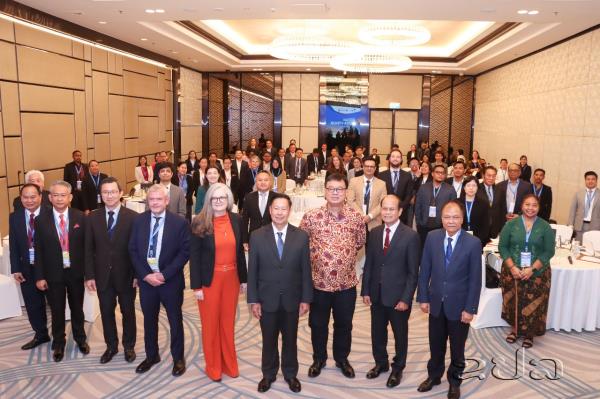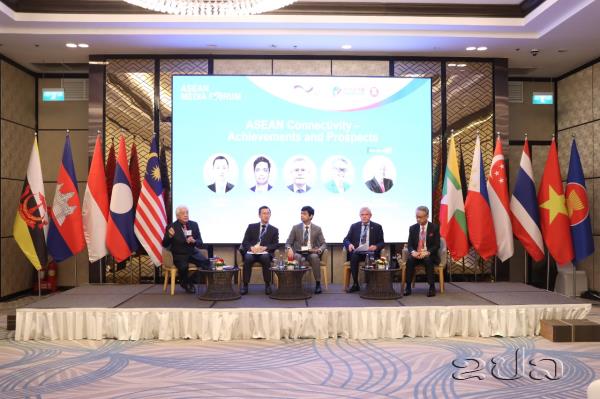KPL
Media officials, editors, and senior journalists from ASEAN member states convened in Vientiane on Monday for the 8th ASEAN Media Forum (AMF) to address pressing issues in the evolving media landscape.
The forum featured prominent speakers, including Nicole Stechmann, Chargée d'Affaires of the German Embassy to Laos; Dr. Mirza Sadaqat Huda, Lead Researcher of the Climate Change in Southeast Asia Programme at the ISEAS-Yusof Ishak Institute; Mark Gallagher, EU Ambassador to Laos; Suriyan Vichitlekarn, Executive Director of the Mekong Institute.

(KPL) Media officials, editors, and senior journalists from ASEAN member states convened in Vientiane on Monday for the 8th ASEAN Media Forum (AMF) to address pressing issues in the evolving media landscape.
The forum featured prominent speakers, including Nicole Stechmann, Chargée d'Affaires of the German Embassy to Laos; Dr. Mirza Sadaqat Huda, Lead Researcher of the Climate Change in Southeast Asia Programme at the ISEAS-Yusof Ishak Institute; Mark Gallagher, EU Ambassador to Laos; Suriyan Vichitlekarn, Executive Director of the Mekong Institute; and Ambassador Yong Chanthalangsy, Laos’ Representative to the ASEAN Intergovernmental Commission on Human Rights (AICHR) and AICHR Chair.
The forum featured several panel discussions focusing on ASEAN connectivity and resilience in areas such as infrastructure, logistics, institutional capacity building, energy integration, and regional challenges. China-proposed Belt and Road Initiative's flagship project - Laos-China railway - and its positive impacts on the regional transport industry and trade were also highlighted during the meeting.

“This event is a tribute to our shared vision for a more connected and resilient ASEAN, reflecting the theme of the Lao PDR’s ASEAN Chairmanship in 2024,” remarked Deputy Minister of Information, Culture and Tourism Phosy Keomanyvong. He emphasized that the forum is a vital component of the ASEAN Communication Master Plan 2018–2025, providing a platform for ASEAN spokespersons, particularly the ASEAN Chair.
Forum for Regional Media Engagement
Established in 2017 by the ASEAN Secretariat, the AMF has become an annual flagship event, bringing together media leaders and editors-in-chief from major newspapers across the region. It serves as a platform for engaging ASEAN policymakers, officials, academics, opinion leaders, and business representatives in meaningful dialogue on regional and global issues.
In a video keynote address, ASEAN Secretary-General Kao Kim Hourn highlighted the forum’s focus on enhancing connectivity and resilience, which are critical for ASEAN's progress and prosperity amid rapidly changing global politics and economic conditions.
“By strengthening connections within our region and beyond, we can unlock new opportunities for growth, innovation, and cultural exchange. Additionally, building resilience will enable ASEAN to navigate uncertainties and challenges more effectively,” said Kao Kim Hourn.
He stressed the increasing importance of effective and independent media, particularly in the face of significant challenges. Traditional media outlets are struggling to reach audiences effectively as social media becomes the dominant source of information for many, especially younger generations.
Media Landscape in Transition
Kao Kim Hourn noted the proliferation of misinformation, declining trust in traditional media, and economic pressures that jeopardize journalistic independence and integrity. While social media has democratized access to information, it has also amplified the spread of false narratives, complicating the media landscape across ASEAN and beyond.
The AMF continues to play a pivotal role in addressing these challenges, providing a platform for ASEAN to communicate its achievements, goals, and responses to pressing issues while fostering a dialogue on the future of the media in a rapidly changing world.
KPL